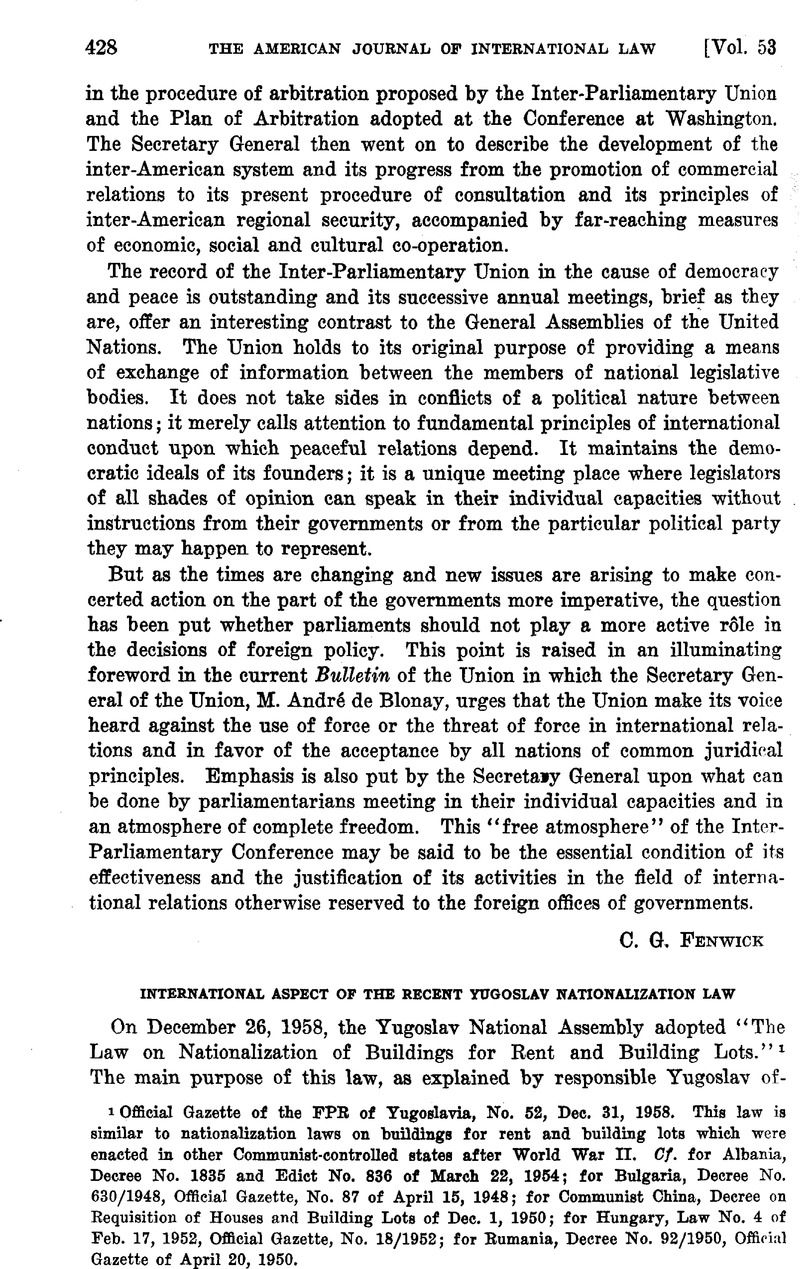Article contents
International Aspect of the Recent Yugoslav Nationalization Law
Published online by Cambridge University Press: 28 March 2017
Abstract

- Type
- Notes and Comments
- Information
- Copyright
- Copyright © American Society of International Law 1959
References
1 Official Gazette of the FPE of Yugoslavia, No. 52, Dec. 31, 1958. This law is similar to nationalization laws on buildings for rent and building lots which were enacted in other Communist-controlled states after World War II. Cf. for Albania, Decree No. 1835 and Edict No. 836 of March 22, 1954; for Bulgaria, Decree No. 630/1948, Official Gazette, No. 87 of April 15, 1948; for Communist China, Decree on Requisition of Houses and Building Lots of Dec. 1, 1950; for Hungary, Law No. 4 of Feb. 17, 1952, Official Gazette, No. 18/1952; for Rumania, Decree No. 92/1950, Official Gazette of April 20, 1950.
2 See “Novi Odnosi” (New Relations), an article written by the Yugoslav legal expert, L. Gerskovic, in “Vjesnik,” No. 4370, Zagreb, Dee. 28, 1958.
3 Arts. 12 ff. and 54 ff. of the Law, Off. Gaz., cited above, pp. 1222 and 1225 ff.
4 Decree No. 432, Official Gazette, No. 52 of Dec. 26, 1953. Similar legal provisions about the management of housing still exist in Czechoslovakia and Poland, where the buildings for rent and building lots have not yet been generally nationalized. Cf. for Czechoslovakia, Law on House Management, No. 67/1956, Official Gazette of Dec. 27, 1936; for Poland, Law on the Public Management of Premises of Dee. 21, 1945, as amended by Decrees No. 343/1950, No. 75/1951 and No. 55/1955.
5 Arts. 42 ff. of the Law, Off. Gaz., cited above, p. 1224.
6 Ibid., Arts. 38 and 47.
7 Cf. Yugoslav-American Agreement of July 19, 1948, 62 Stat. 2658, or Swiss-Yugoslav Agreement of Sept. 28, 1948, Yugoslav Official Gazette, No. 16 of 1949.
8 2 Malloy, Treaties 1613. This convention was recognized as valid after World War I by Yugoslavia.
9 Note 7 above.
10 cf. the Treaty of Friendship, Commerce and Navigation between the United States and The Netherlands, of March 27, 1956, or the Treaty of Friendship, Commerce and Navigation between the United States and the Republic of Korea of Nov. 28, 1956, U. S. Treaties and Other International Agreements, Vol. VIII, pp. 2043 and 2219. Both treaties in their articles VI(4) provide as follows: “Property of nationals and companies of either Party shall not be taken within the territories of the other Party except for a public interest (purpose) nor shall it be taken without the prompt payment of just compensation. Such compensation shall be in an effectively realizable form and shall represent the equivalent of the property taken; and adequate provision shall have been made at or prior to the time of taking for the determination and payment thereof.“
11 Art. 217 of the Serbian Civil Code of 1844, and Art. 365 of the Austrian Civil Code of 1852.
12 62 Stat, at 2660.
13 See S. Friedman, Expropriation in International Law 204-219 (1953); B. Cheng, General Principles of Law as Applied by International Courts and Tribunals 5-50 (1953); I. Seidl-Hohenveldern, Internationales Konfiskations- und Enteignungsrecht (1951); W. L. Gould, An Introduction to International Law 456-469 (1957); Doman, N. E., “Postwar Nationalization of Foreign Property in Europe,” 48 Col. Law Eev. 1125 (1948)Google Scholar. For the U. 8. attitude on payment of compensation, see Hyde, C. C., “Compensation for Expropriation,” 33 A.J.I.L. 108 (1939)Google Scholar, and note 10 above. For Yugoslav theory, see Bartos, M. and Nikolajevic, B. D., Legal Status of Foreigners, Contemporary Practice in Present International Trends and Practice Applied in FPB of Yugoslavia 186 (Belgrade, 1951).Google Scholar
14 Off. Gaas., cited above, p. 1227.
15 Cf. Yugoslav Law on Citizenship, of Aug. 28, 1945, Arts. 3-6. See also Rode, , “Dual Nationals and the Doctrine of Dominant Nationality,” 53 A.J.I.L. 139 (1959).Google Scholar
16 Cf. Yugoslav Law on Citizenship, Art. 22, and the decrees issued by the Yugoslav Federal Secretariat for Home Affairs on the basis of this article. See, for instance, Decree No. IV/2 11.261/56, of June 6, 1956, in the matter of Mrs. Draga Radan.
- 1
- Cited by


